

DG_Handbuch_NN.pdf. Herdict Blog » Blog Archive » DPI Threat to Freedom of Expression. The Fragile State of Media Freedom in Latin America. Netzaktivisten: Club der Visionäre. Berlin ist die Heimat der Netzaktivisten: Sie kippen Gesetze, beraten Parteien und bringen die alte Ordnung durcheinander. Die Nerds haben jetzt Macht. Aber was wollen sie damit? DIE ZEIT Nº 29/201212. Juli 2012 08:00 Uhr Speichern. The engine room. The engine room has been on the road recently, Alix presenting the Tahrir data project at this year’s Personal Democracy Forum, and I presenting on open data standards for international human rights indices, with quite a bit going on in-between.
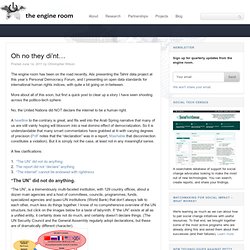
More about all of this soon, but first a quick post to clear up a story I have seen shooting across the politico-tech sphere: Action. The War for India's Internet - By Rebecca MacKinnon. "65 years since your independence," a new battle for freedom is under way in India -- according to a YouTube video uploaded by an Indian member of Anonymous, the global "hacktivist" movement.

With popular websites like Vimeo.com blocked across India by court order, the video calls for action: "Fight for your rights. Fight for India. " Over the past several weeks, the group has launched distributed denial-of-service attacks against websites belonging to Internet service providers, government departments, India's Supreme Court, and two political parties. Internet Freedom: Beyond Circumvention. Posted by Ethan on Feb 22nd, 2010 in Geekery, Human Rights | 19 comments Secretary Clinton’s recent speech on Internet Freedom has signaled a strong interest from the US State Department in promoting the use of the internet to promote political reforms in closed societies.
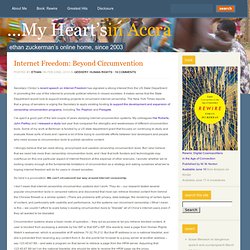
It makes sense that the State Department would look to support existing projects to circumvent internet censorship. The New York Times reports that a group of senators is urging the Secretary to apply existing funding to support the development and expansion of censorship circumvention programs, including Tor, Psiphon and Freegate. I’ve spent a good part of the last couple of years studying internet circumvention systems. My colleagues Hal Roberts, John Palfrey and I released a study last year that compared the strengths and weaknesses of different circumvention tools. I strongly believe that we need strong, anonymized and useable censorship circumvention tools. Here’s the problem.
Most internet traffic is domestic. Freedom of the Press 2012. Breakthroughs and Pushback in the Middle East The year 2011 featured precarious but potentially far-reaching gains for media freedom in the Middle East and North Africa.
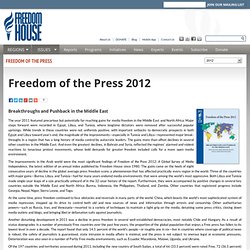
Major steps forward were recorded in Egypt, Libya, and Tunisia, where longtime dictators were removed after successful popular uprisings. While trends in these countries were not uniformly positive, with important setbacks to democratic prospects in both Egypt and Libya toward year’s end, the magnitude of the improvements—especially in Tunisia and Libya—represented major breakthroughs in a region that has a long history of media control by autocratic leaders.
Threats to the Open Net: May 4, 2012. When Social Networks Become Tools of Oppression: Jillian C. York. When Syria’s government unblocked Facebook, YouTube and Blogspot in February, many activists saw the move as an overture to protesters, possibly one offering a semblance of the freedoms won by insurgents in Egypt and Tunisia.
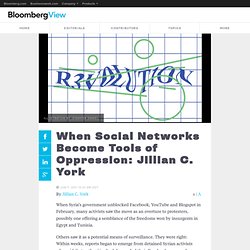
Others saw it as a potential means of surveillance. They were right: Within weeks, reports began to emerge from detained Syrian activists who said that authorities had demanded their Facebook passwords. Others inside the country noted that their friends’ Facebook walls had been compromised and now contained pro-regime sentiment. On Twitter, Syrian protesters have noted the emergence of pro-regime “spambots”: accounts set up with automated feeds that post benign content, including links to attractive photographs of Syrian landscapes, to the hashtag used by protesters and supporters, presumably to flood it with contradictory information. Activists believe the bots have been created by regime supporters, paid or otherwise. Upper Hand. A Moment in Time: A Very Short History of Content Regulation. Renata Uitz of Central European University welcomes Rob Faris, research director of the Berkman Center and the OpenNet Initiative.

"A bunch of smart people invented the internet," says Faris, highlighting the wonderful ways in which the Internet brought millions of people together. "People began using the Internet for various other things too - porn, making fun of religion and national leaders...On the Internet we have the good, the ugly, and the illegal, and a whole lot of it. " Faris asks us to pause and think about how we might draw a line between that which is offensive or very offensive and that which is illegal. The changing face of digital rights activism. San Francisco, CA - In February 2012, Twitter announced a new mechanism that would allow the company to minimise the effects of government censorship requests.

Though new for Twitter, the idea of per-country takedowns has existed in the industry since at least 2006, when Google blocked Thai visitors to certain YouTube videos by IP address in order to comply with local laws. Video: 10 Most Censored Countries - Reports. Why is Data Journalism Important? The Guardian on Facebook. IREX - Civil Society, Education and Media Development. Overview of MSI Europe & Eurasia The 2013 MSI study for Europe & Eurasia found a mix of positive and negative developments in almost every country.
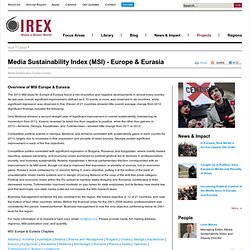
As last year, overall significant improvement, defined as 0.10 points or more, was observed in six countries, while significant regression was observed in five. Eleven of 21 countries showed little overall average change from 2012. Significant findings included the following: Only Moldova showed a second straight year of significant improvement in overall sustainability, maintaining its momentum from 2012. Competitive political scenes in Georgia, Moldova, and Armenia correlated with sustainability gains in each country for 2013, largely due to increases in free expression and plurality of news sources.
Open Government Partnership: an introduction. The Open Government Partnership (OGP) is a global effort to make governments better.
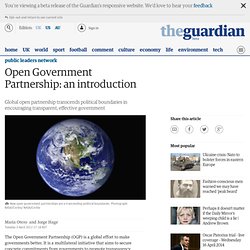
It is a multilateral initiative that aims to secure concrete commitments from governments to promote transparency, empower citizens, fight corruption and create safer communities. By finding new ways to engage with citizens, including using the latest technologies, governments can tap their expertise to make better decisions. Wer kontrolliert Medien? Wer kontrolliert Medien?
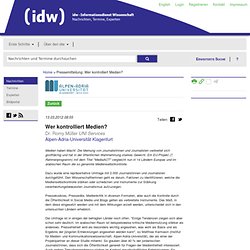
Medien haben Macht: Die Meinung von Journalistinnen und Journalisten verbreitet sich großflächig und hat in der öffentlichen Wahrnehmung starkes Gewicht. Ein EU-Projekt (7. THE ASIA MEDIA DIRECTORY 2011, Media Programme Asia. Edited by Alastair Carthew and Simon Winkelmann Asia Media Update.
Data Retention. Freedom of connection, freedom of expression: the changing legal and regulatory ecology shaping the Internet. This report provides a new perspective on the social and political dynamics behind the threats to expression. It develops a conceptual framework on the ‘ecology of freedom of expression’ for discussing the broad context of policy and practice that should be taken into consideration in discussions of this issue. Over the first decade of the 21st century, the Internet and its convergence with mobile communications has enabled greater access to information and communication resources.
In 2010, nearly 2 billion people worldwide – over one quarter of the world’s population – use the Internet. MediaLandscape2011.pdf (application/pdf Object) Case study reports – Media regulation: A panacea for free and independent media? « MEDIADEM. The 10 Tools of Online Oppressors - Reports. SAN FRANCISCO In reporting news from the world’s most troubled nations, journalists have made a seismic shift this year in their reliance on the Internet and other digital tools. Blogging, video sharing, text messaging, and live-streaming from cellphones brought images of popular unrest from the central square of Cairo and the main boulevard of Tunis to the rest of the world.
In Other Languages • Español • Português • Français • Русский • العربية • Multimedia • Audio Report: Offenders and TacticsIn Print • Download the pdfMore on This Issue • CPJ Internet Channel: Danny O'Brien's blog • Blogging in Egypt: Virtual network, virtual oppression • Burmese exile news site endures hacking, DDoS attacks.